Originality & toning
 crypto79
Posts: 8,623 ✭
crypto79
Posts: 8,623 ✭
Another member posted a nice coin with a decent skin that I made the comment that it wasn't Gem original but very nice. They responded that if it was CAC and JA like it thus had to be 100% original. I just thought that this would be a good time to kind of do a show and tell to show some common things for people who have a hard time telling the difference between nice & original. JA knows what is market acceptable better than just about anybody but nobody known originality unless it is a slam dunk one way or the other. Mine are rules not laws and I think the grey area coins that are hard to tell apart are the reason why people seek out the (admittedly sometimes ugly) coins knowing the beauty is in the eye of the beholder the the joy of unquestioned originality is strong.
It should be noted that there are exceptions to every rule look wise due to unique environments but you will see the same looks repeated over the thousands of coins out there and patterns emerge. Also the NUMBER 1(!!!) thing to remember is that originality is different form eye appeal and most 100% original coins are often crusty and on the lower end of the Markets preference of eye appeal. The market prefers an older dipping clean surface coin that has re-toned lightly with contrasting shades that doesn't impact luster or mint bloom. Also there is quite the grey area where some original coins are only slightly lightened with diluted dip which is the rage currently to get the best of both worlds. Also while Acetone doesn't impact toning it strips just about everything else off the surface, you can have original toning with stripped skin and the areas that were dirt protected often become reactive to fresh exposure. I will speak to cirulated XF45-au58 coins as the rules for true UNCs are different.
For the ones of you that really want to know about pure originality, RYK "get's it" and his threads about "Dirty Gold" are a road map to real originality and while his is about gold the principles of dirty really go across all series. Note: most other people who show dirty gold do not know what they are talking about (with a few exceptions) and one should not put much weight.
One must understand how coins were used (esp circulated ones) and how patina applies to the coin's surfaces in layers. You should see layers of age unevenly applied. On the OP coin I see 1 layer with only 2 colors.
This is the original coin talked about.

While it is a great coin I would love to own the 1st red flag is the dark halos around the devices. the 2nd is the silver color silver. The funny thing about toning is the lest common color of toned silver is slate grey silver and while there are come original coins out there with that shade it is rarely so even. One should always focus on the grade of the coin before gauging expectations and the first we should note is the apparent lack of mint bloom/ frost and low luster while still having AU level details. There are really main 3 ways a coin loses luster
1-wear
2-tone build up
3-processing/stripping .
That said the coin doesn't have the luster to support a AU grade so XF45 it is although high end as it is really an AU netted down.
Talking about the halos-- Worn Coins often have lighter halos around the devices where the fields protected and the luster isn't rubbed down such as these two 100% original coins. Going back to the question of layers and colors ( how many do you see on these 3?)
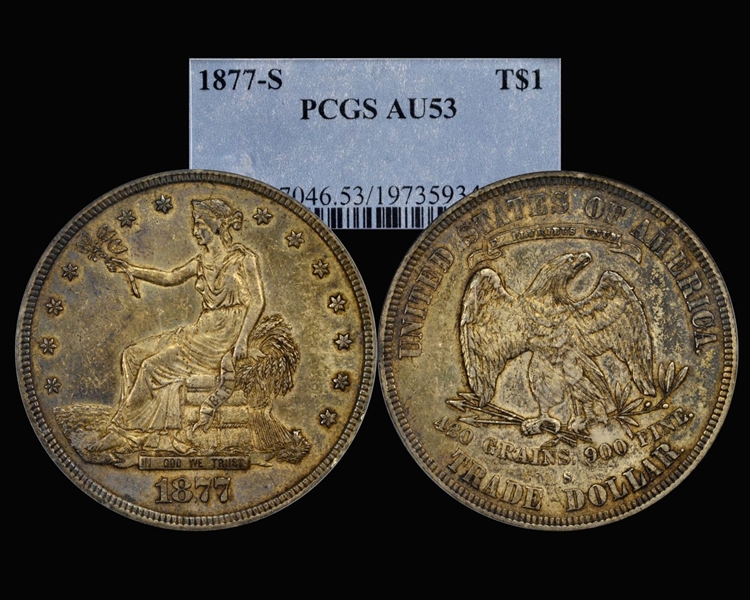

The open area will tone one way and the crevices will turn at a slower right as they get less exposure. creating a Light effect halo
When a coin is cleaned the opposite happens and the protected hold on to there funk where the open areas get the brunt of the wipe/dip/thumb. Creating dark halos
a well cleaned coin
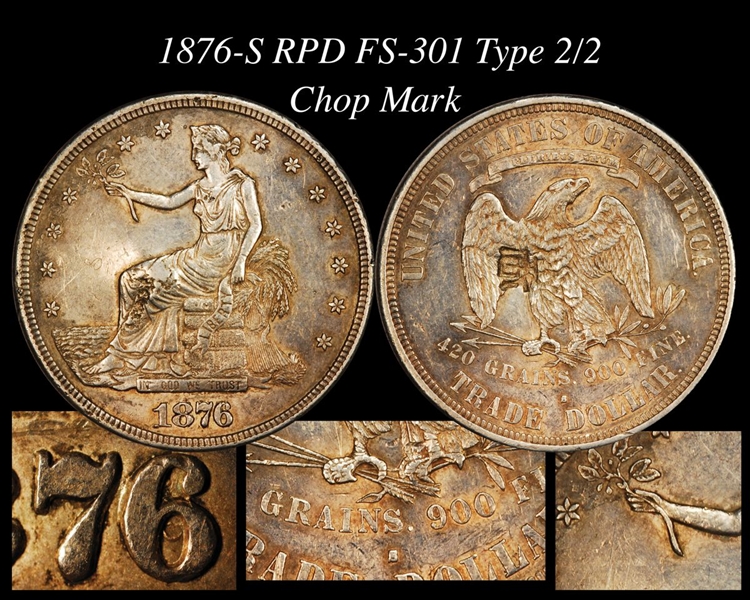
heavily dipped and retoned
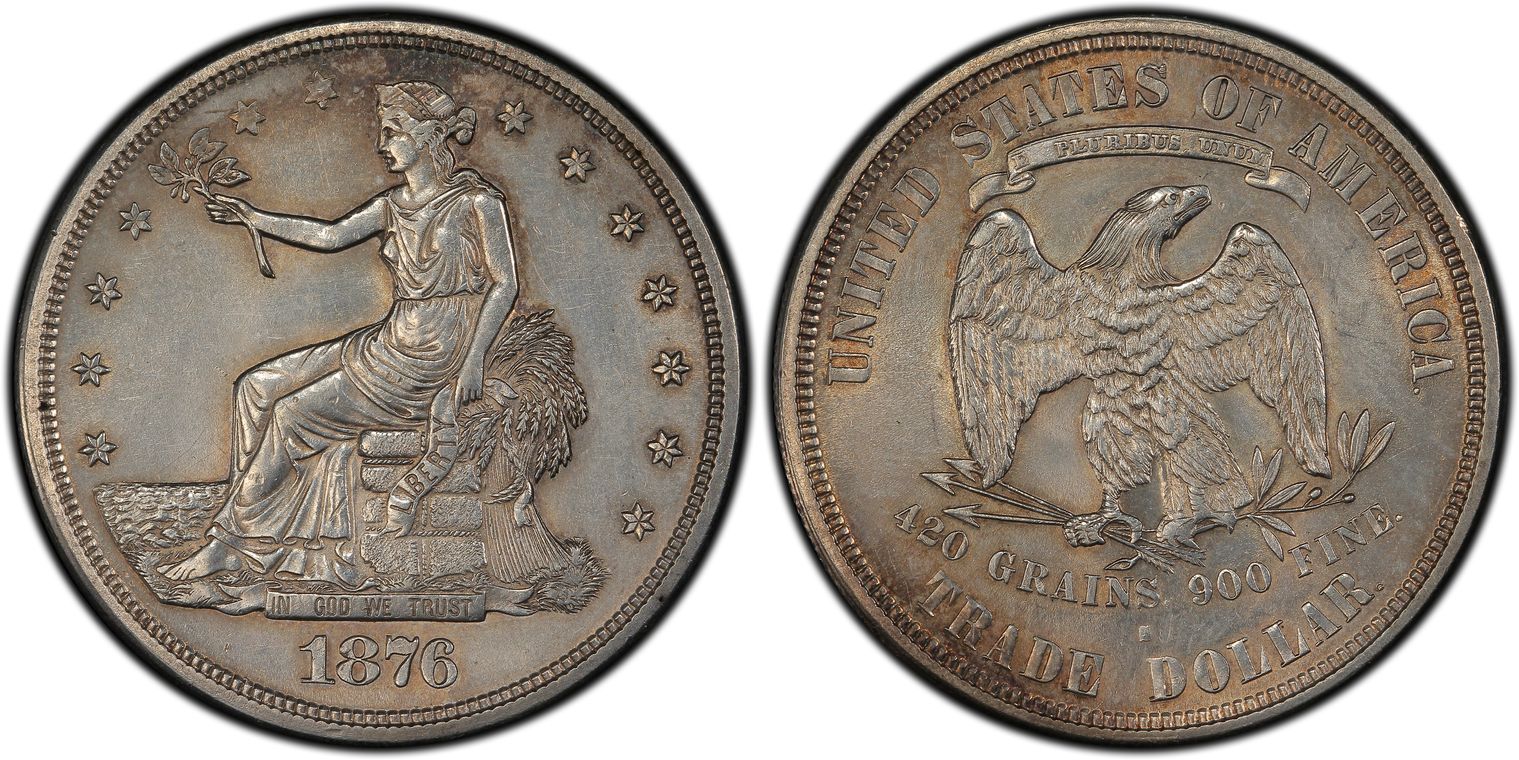
Harshly cleaned (note similar look to OP coin although mine is worse)(Ex NGC53 and current pcgs45, pic a little over exposed)
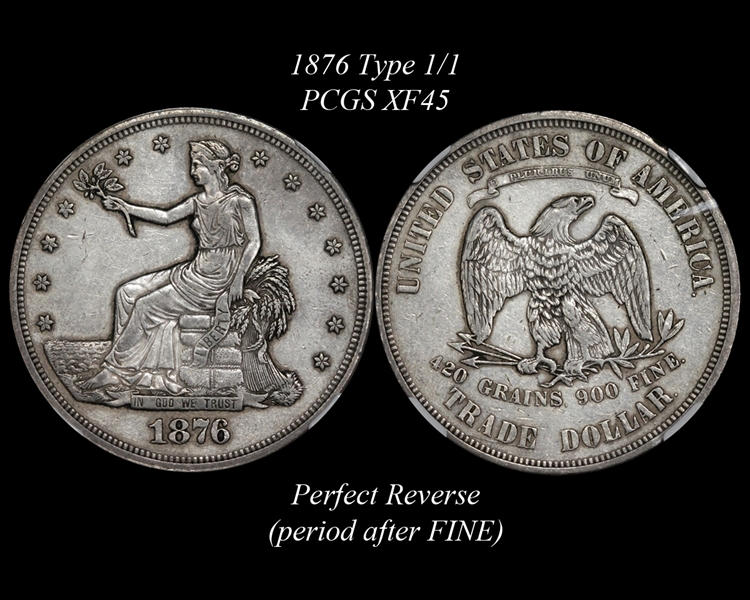
Exception--Note Proof like/Proof coins do tone different as the polished fields often run out near the devices which affects wear patterns and what not. Here is a heavily PL coin that doesn't necessarily adhere to Light halos but follows the layered expected wear pattern
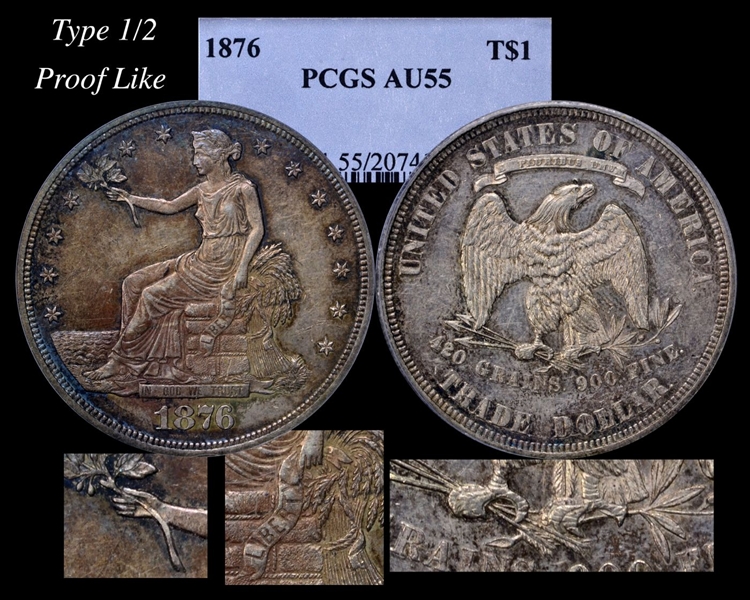
What happens if there is dark halo old fashioned dirt around my devices, does that break the rule? No
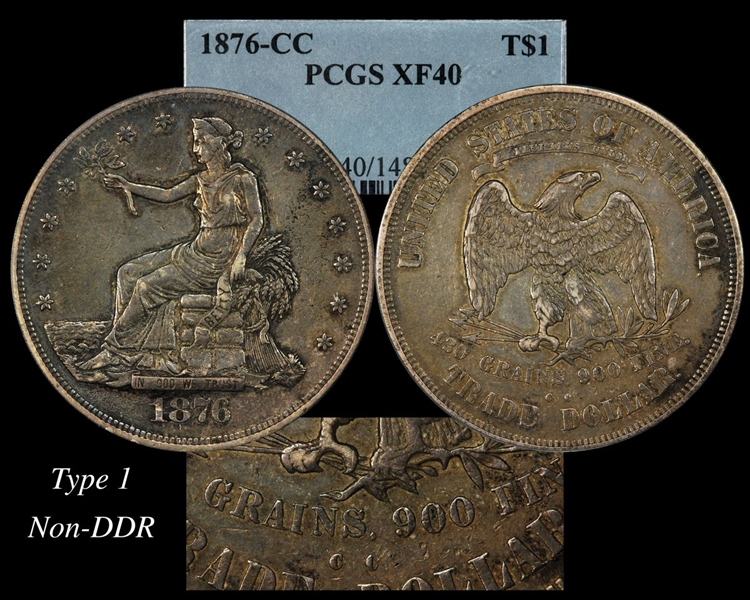
Note this coin has real crud around Miss Liberty but upon further inspection one can see that the tone underneath is much lighter and if one was to acetone the coin there would be a bright Lighter halo around the devices. In the spots where there isn't any crud like the eagle the halo rule is still in effect. Note the halo is metal color not grime.
Dirty original Silver

A golden toned stunner that has darker halos and only 1 layer of age- not original (This would be considered the more eye appealing coin by most collectors)
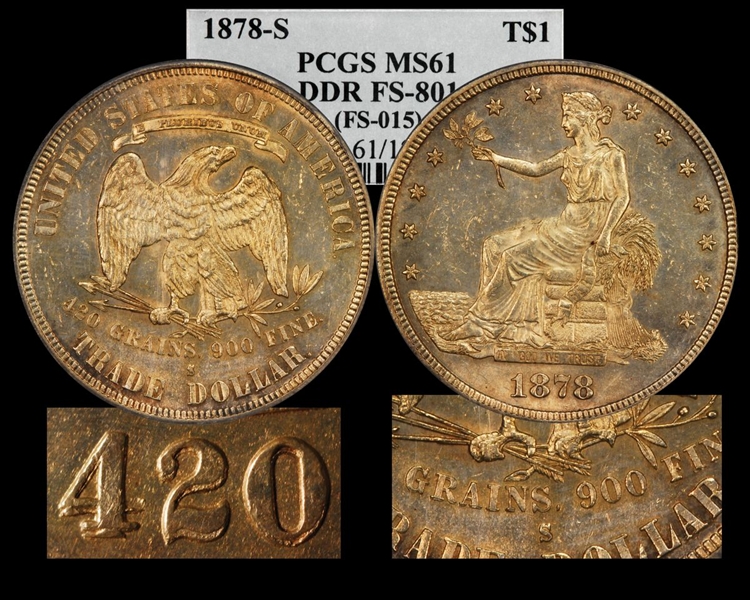
Nice net graded for skin- original AU
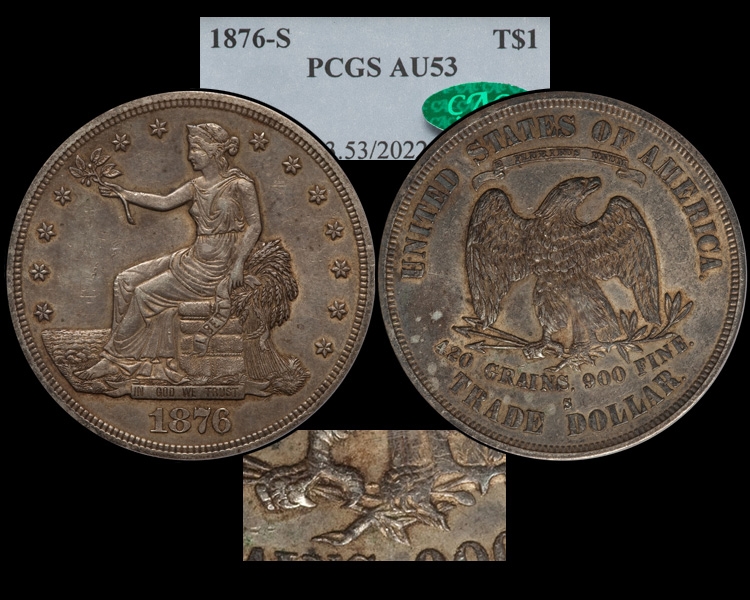
Market AU58 tastefully lighted for grade (note darker halos)
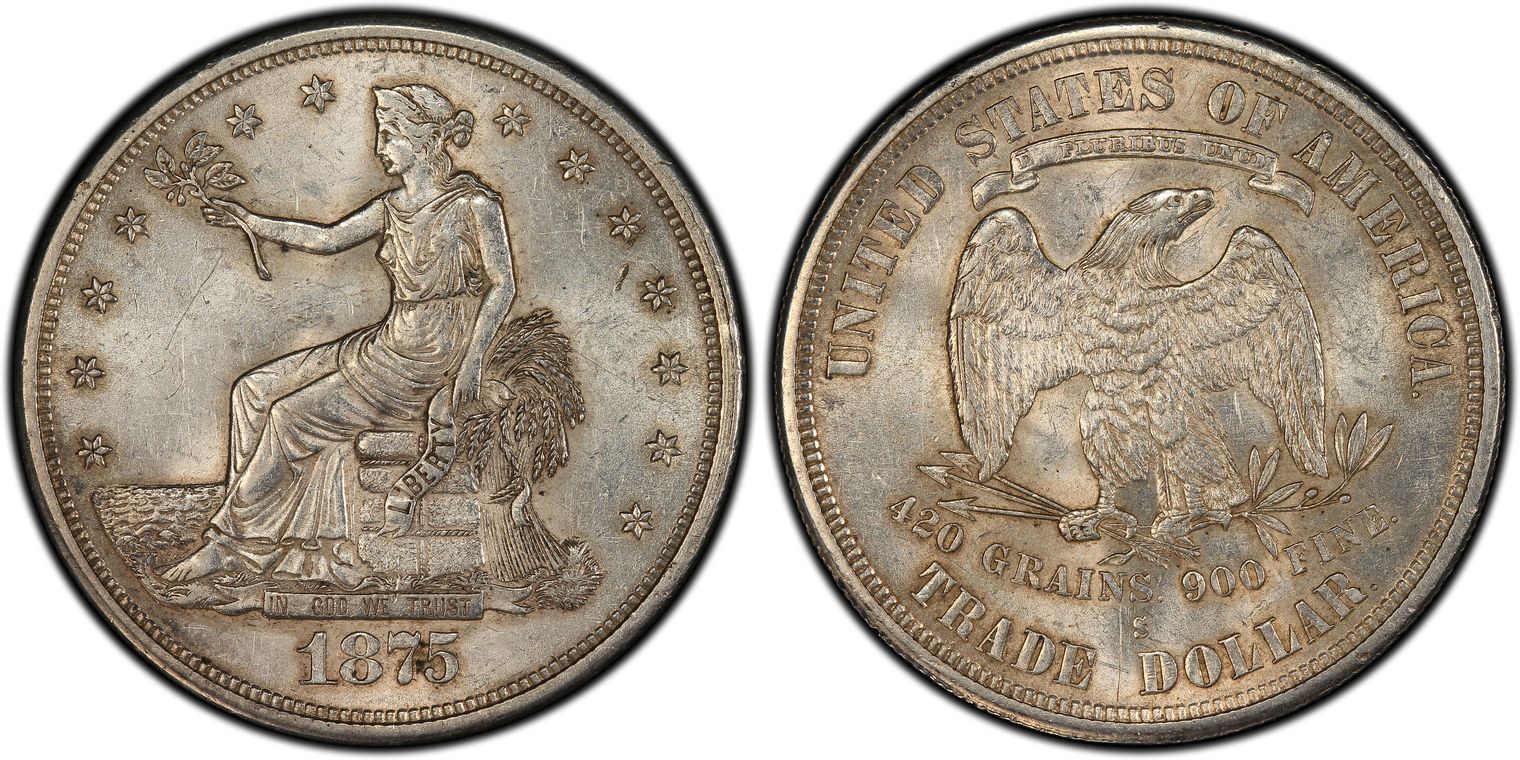
Sometimes a coin can adhere to the rules on one side and have an environmental impact on the other that throws off the toning pattern on the other like paper or storage holder. Still look for layers and age and gunk and places where the toning wasn't influenced.
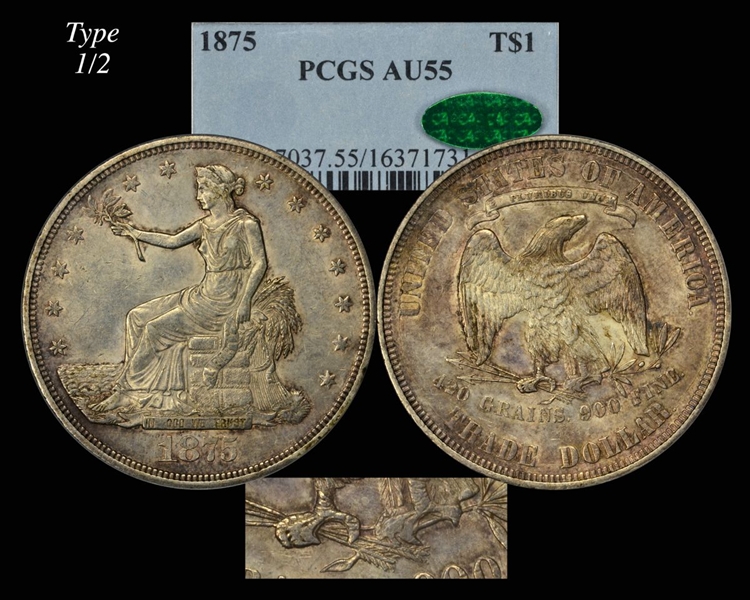
It should be noted that there are exceptions to every rule look wise due to unique environments but you will see the same looks repeated over the thousands of coins out there and patterns emerge. Also the NUMBER 1(!!!) thing to remember is that originality is different form eye appeal and most 100% original coins are often crusty and on the lower end of the Markets preference of eye appeal. The market prefers an older dipping clean surface coin that has re-toned lightly with contrasting shades that doesn't impact luster or mint bloom. Also there is quite the grey area where some original coins are only slightly lightened with diluted dip which is the rage currently to get the best of both worlds. Also while Acetone doesn't impact toning it strips just about everything else off the surface, you can have original toning with stripped skin and the areas that were dirt protected often become reactive to fresh exposure. I will speak to cirulated XF45-au58 coins as the rules for true UNCs are different.
For the ones of you that really want to know about pure originality, RYK "get's it" and his threads about "Dirty Gold" are a road map to real originality and while his is about gold the principles of dirty really go across all series. Note: most other people who show dirty gold do not know what they are talking about (with a few exceptions) and one should not put much weight.
One must understand how coins were used (esp circulated ones) and how patina applies to the coin's surfaces in layers. You should see layers of age unevenly applied. On the OP coin I see 1 layer with only 2 colors.
This is the original coin talked about.

While it is a great coin I would love to own the 1st red flag is the dark halos around the devices. the 2nd is the silver color silver. The funny thing about toning is the lest common color of toned silver is slate grey silver and while there are come original coins out there with that shade it is rarely so even. One should always focus on the grade of the coin before gauging expectations and the first we should note is the apparent lack of mint bloom/ frost and low luster while still having AU level details. There are really main 3 ways a coin loses luster
1-wear
2-tone build up
3-processing/stripping .
That said the coin doesn't have the luster to support a AU grade so XF45 it is although high end as it is really an AU netted down.
Talking about the halos-- Worn Coins often have lighter halos around the devices where the fields protected and the luster isn't rubbed down such as these two 100% original coins. Going back to the question of layers and colors ( how many do you see on these 3?)


The open area will tone one way and the crevices will turn at a slower right as they get less exposure. creating a Light effect halo
When a coin is cleaned the opposite happens and the protected hold on to there funk where the open areas get the brunt of the wipe/dip/thumb. Creating dark halos
a well cleaned coin

heavily dipped and retoned

Harshly cleaned (note similar look to OP coin although mine is worse)(Ex NGC53 and current pcgs45, pic a little over exposed)

Exception--Note Proof like/Proof coins do tone different as the polished fields often run out near the devices which affects wear patterns and what not. Here is a heavily PL coin that doesn't necessarily adhere to Light halos but follows the layered expected wear pattern

What happens if there is dark halo old fashioned dirt around my devices, does that break the rule? No

Note this coin has real crud around Miss Liberty but upon further inspection one can see that the tone underneath is much lighter and if one was to acetone the coin there would be a bright Lighter halo around the devices. In the spots where there isn't any crud like the eagle the halo rule is still in effect. Note the halo is metal color not grime.
Dirty original Silver

A golden toned stunner that has darker halos and only 1 layer of age- not original (This would be considered the more eye appealing coin by most collectors)

Nice net graded for skin- original AU

Market AU58 tastefully lighted for grade (note darker halos)

Sometimes a coin can adhere to the rules on one side and have an environmental impact on the other that throws off the toning pattern on the other like paper or storage holder. Still look for layers and age and gunk and places where the toning wasn't influenced.

2
Comments
Hopefully I know what I am talking about when it comes to dirty gold, since that is what I also collect.
Latin American Collection
Thanks for sharing!
I learned quite a bit from having read it.
<< <i>Agree, very good post.
Hopefully I know what I am talking about when it comes to dirty gold, since that is what I also collect. >>
You have learned well, Grasshopper.
Excellent post, Crypto!
I would also challenge the notion that CAC=100% Original. In my first conversation with JA (a lunch meeting the Milwaukee ANA) in which he introduced some of us collectors to the CAC concept, he was specifically asked if the CAC approval would be a confirmation of originality. I do not remember his exact response, but my take-home message was that for numerous reasons, that hurdle would be too high.
-Ron
Great post Crypto, I enjoyed reading it.
Successful Transactions With: JoeLewis, Mkman123, Harry779, Grote15, gdavis70, Kryptonitecomics
RMR: 'Wer, wenn ich schriee, hörte mich denn aus der Engel Ordnungen?'
CJ: 'No one!' [Ain't no angels in the coin biz]
<< <i>Excellent post and I will only add the each collector must customize the "rules" for their respective series. Different designs will age differently based on metal/strike/amount of field metal exposed vs. devices and placement of such. Truly original coins of different age will look different, ie. a 100 year old original coin should look different than a 200 year old coin. >>
That is the 102 class, I got tired of writing so stopped at 101. All good points and figured people would like to look at a couple more trade dollars
acceptable/solid for the grade, though dipped at one time. Just because a coin was dipped once doesn't mean it can't be desireable and nice for the grade. There are collectors that
seek out coins like that. I just don't happen to be one of them. The sticker is basically a note to JA that it meets his minumum standards for making an offer on the coin at some time
in the future....without necessarily having to see it again.
<< <i> The sticker is basically a note to JA that it meets his minumum standards for making an offer on the coin at some time
in the future....without necessarily having to see it again. >>
This is a very practical and simple statement summarizing the role of CAC certification. JA makes a market in CAC stickered coins. The certification process is an extremely effective means to establish a market supply that means a minimum standard.
Latin American Collection
<< <i>
<< <i>Excellent post and I will only add the each collector must customize the "rules" for their respective series. Different designs will age differently based on metal/strike/amount of field metal exposed vs. devices and placement of such. Truly original coins of different age will look different, ie. a 100 year old original coin should look different than a 200 year old coin. >>
That is the 102 class, I got tired of writing so stopped at 101. All good points and figured people would like to look at a couple more trade dollars
Nice job, especially on mentioning the caveats.
<< <i>Just because a coin was dipped once doesn't mean it can't be desirable and nice for the grade. There are collectors that seek out coins like that. I just don't happen to be one of them. >>
Yep...but I AM one of them. To each their own I guess.
jom
<< <i>CAC isn't perfect and mistakes are made but with that we know that CAC will make good on their mistakes as opposed to other grading companies. >>
Huh?
Coin Rarities Online
We'll use our hands and hearts and if we must we'll use our heads.
<< <i>I think there is a point that has been overlooked.
First CAC stickers market acceptable coins, we all know that, so nothing new there.
Second CAC isn't perfect and mistakes are made but with that we know that CAC will make good on their mistakes as opposed to other grading companies.
But lastly and more importantly imho I also know that many people ask Mr Albanese that he look at photos of their coins to see if it would get a sticker and his response is I won't grade from a photo, this thread is remindful of that scenario. This thread promotes submitters to now send photos of their coins in to CAC for stickering under a new quicker service designation? I can see it now, stickers on their 4x6's & 8x10's. The point is that it is impossible to grade from photos and an in hand examination is a necessity. So as good as this thread is for educational purposes in the end one cannot rely on any photo period for accurate grading and accurate commentary. >>
What?? This thread has nothing to do with CAC
I am not saying you are crazy, I have just seen little evidence to the contrary.
<< <i>Well done John. All good information. Thanks!!! >>
I 100% agree!
<< <i>I think there is a point that has been overlooked.
First CAC stickers market acceptable coins, we all know that, so nothing new there.
Second CAC isn't perfect and mistakes are made but with that we know that CAC will make good on their mistakes as opposed to other grading companies.
But lastly and more importantly imho I also know that many people ask Mr Albanese that he look at photos of their coins to see if it would get a sticker and his response is I won't grade from a photo, this thread is remindful of that scenario. This thread promotes submitters to now send photos of their coins in to CAC for stickering under a new quicker service designation? I can see it now, stickers on their 4x6's & 8x10's. The point is that it is impossible to grade from photos and an in hand examination is a necessity. So as good as this thread is for educational purposes in the end one cannot rely on any photo period for accurate grading and accurate commentary. >>
This is not a thread about grading or CAC submissions. This is a thread about originality. Short of crypto sending his coins around the country for all of us to inspect in person, I believe that the photos provided are more than adequate to make the points that he is making.
<< <i>Thanks for posting this, very informative!
+1
Thank you so much for putting forth the effort and for your generousity in sharing of knowledge and experience.
This is the type of effort and spirit of giving that make this such an outstanding venue.
Certainly worthy of a bookmark in my book!
Happy, humble, honored and proud recipient of the “You Suck” award 10/22/2014
l
It's not having what you want, it's wanting what you've got.
How about this one?
The 15-D appears to be the most natural of the 3
Edit: The original image for the 1915 was smaller and not as much detail could be seen .. The close up leads me to believe it has been washed with soap and water and probably dipped once or ten times.
The bigger question is how did those two coins get into problem free holders with the rim damage? That is equally or even more concerning than the questionable surface quality
My original dyslexic post was meant to say the 1900 with the rim ding was the more original coin. Now I see they both have rim dings though - I missed the ding on the 94 the first time .. The 1894 could be original but could be dipped and washed also - hard to say from that pix
<< <i>Aside from the rim ding, the 94 is clearly the more original coin over the dipped/retoned 1900.
The 15-D appears to be the most natural of the 3 >>
I disagree. Re-read the part above about halos. The 1900 is the most original. The 1894 you see dark around the devices, as with the 1st subject coin in the OP.
<< <i>Aside from the rim ding, the 94 is clearly the more original coin over the dipped/retoned 1900.
The 15-D appears to be the most natural of the 3 >>
Return to post 1 and review....
Latin American Collection
Regarding the Barbers, the 1900 looks like "original" coins that I have pulled out of somewhat organic environments such as leather coin purses, wooden jewelry boxes, wallets, and the like. Not a popular look, but "original."
The 1894 might be original, or it might not. Someone could have skillfully lightened the coin. Or, it could be light in the centers with crud in the devices from people's fingers rubbing the coin in normal commerce, handling the coin in their pocket before paying a subway fare. Stored in a dry environment. When you open $1000 bags of 90% silver, this is what many of the circulated Barbers, Walkers, Franklins, and Washington's look like. Surely, no one has gone through and cleaned all of those coins. Is this one original? Tough to say. But since someone paid to get it holdered, it could have been helped a little bit prior to certification. I wouldn't use the term "original" on it, but I probably wouldn't call foul, either.
Regardless, there are some solid points here, but I think a case-by-case approach should be used to analyze surfaces on coins.
In honor of the memory of Cpl. Michael E. Thompson
<< <i>
<< <i>Aside from the rim ding, the 94 is clearly the more original coin over the dipped/retoned 1900.
The 15-D appears to be the most natural of the 3 >>
I disagree. Re-read the part above about halos. The 1900 is the most original. The 1900 you see dark around the devices, as with the 1st subject coin in the OP. >>
I agree with Dan, while the 1915 is a decent coin I believe it to be partially stripped in a diluted bath leaving some skin. Put another way, I think the 1915 looked much like the 1900 and what was left after the bath with some grime and the heaviest toning lighter in patches along with the slate grey skin. Now if you asked the question which look is the most marketable? A strong case for the 1915 can be made.
The dark halos are often whats left of the light original halos as the textured protected areas hold on better than the rubbed fields. The acids preform the uniform lightening to the fields and even break down the heaver patches by star1. If you note some gunk by the ear is also a little lighter than it might other wise be.
Part of the larger point about analyzing any coin, it is all circumstantial but one must really understand cause & effect and look for patterns that only present them selves after looking at 1000s of coins. Maybe we should do (original or not) threads to teach as well as the guess the grades.
<< <i>It can be a dangerous game to play "guess the original coin" using images,
Regardless, there are some solid points here, but I think a case-by-case approach should be used to analyze surfaces on coins. >>
I agree completely, just trying to impart warning flags and general themes and it wouldn't take long to find dozens of exceptions to any of them. The whole point is to encourage a case-by-case approach of the coin as to empower collectors to not exclusively rely on grading and third parties. Many, many people don't understand even the basics of originality/patina. As with other hobbies, the move towards originality will end up affecting their equity which will affect their enjoyment of the hobby IMO.
The three pictures posted at toward the end this thread are still better than no pictures or not attempting to raise the awareness to the question of originality. I like the second coin best
Experience the World through Numismatics...it's more than you can imagine.
<< <i>Another member posted a nice coin with a decent skin that I made the comment that it wasn't Gem original but very nice. They responded that if it was CAC and JA like it thus had to be 100% original. I just thought that this would be a good time to kind of do a show and tell to show some common things for people who have a hard time telling the difference between nice & original. JA knows what is market acceptable better than just about anybody but nobody known originality unless it is a slam dunk one way or the other. Mine are rules not laws and I think the grey area coins that are hard to tell apart are the reason why people seek out the (admittedly sometimes ugly) coins knowing the beauty is in the eye of the beholder the the joy of unquestioned originality is strong.
It should be noted that there are exceptions to every rule look wise due to unique environments but you will see the same looks repeated over the thousands of coins out there and patterns emerge. Also the NUMBER 1(!!!) thing to remember is that originality is different form eye appeal and most 100% original coins are often crusty and on the lower end of the Markets preference of eye appeal. The market prefers an older dipping clean surface coin that has re-toned lightly with contrasting shades that doesn't impact luster or mint bloom. Also there is quite the grey area where some original coins are only slightly lightened with diluted dip which is the rage currently to get the best of both worlds. Also while Acetone doesn't impact toning it strips just about everything else off the surface, you can have original toning with stripped skin and the areas that were dirt protected often become reactive to fresh exposure. I will speak to cirulated XF45-au58 coins as the rules for true UNCs are different.
For the ones of you that really want to know about pure originality, RYK "get's it" and his threads about "Dirty Gold" are a road map to real originality and while his is about gold the principles of dirty really go across all series. Note: most other people who show dirty gold do not know what they are talking about (with a few exceptions) and one should not put much weight.
One must understand how coins were used (esp circulated ones) and how patina applies to the coin's surfaces in layers. You should see layers of age unevenly applied. On the OP coin I see 1 layer with only 2 colors.
This is the original coin talked about.
While it is a great coin I would love to own the 1st red flag is the dark halos around the devices. the 2nd is the silver color silver. The funny thing about toning is the lest common color of toned silver is slate grey silver and while there are come original coins out there with that shade it is rarely so even. One should always focus on the grade of the coin before gauging expectations and the first we should note is the apparent lack of mint bloom/ frost and low luster while still having AU level details. There are really main 3 ways a coin loses luster
1-wear
2-tone build up
3-processing/stripping .
That said the coin doesn't have the luster to support a AU grade so XF45 it is although high end as it is really an AU netted down.
Talking about the halos-- Worn Coins often have lighter halos around the devices where the fields protected and the luster isn't rubbed down such as these two 100% original coins. Going back to the question of layers and colors ( how many do you see on these 3?)
The open area will tone one way and the crevices will turn at a slower right as they get less exposure. creating a Light effect halo
When a coin is cleaned the opposite happens and the protected hold on to there funk where the open areas get the brunt of the wipe/dip/thumb. Creating dark halos
a well cleaned coin
heavily dipped and retoned
Harshly cleaned (note similar look to OP coin although mine is worse)(Ex NGC53 and current pcgs45, pic a little over exposed)
Exception--Note Proof like/Proof coins do tone different as the polished fields often run out near the devices which affects wear patterns and what not. Here is a heavily PL coin that doesn't necessarily adhere to Light halos but follows the layered expected wear pattern
What happens if there is dark halo old fashioned dirt around my devices, does that break the rule? No
Note this coin has real crud around Miss Liberty but upon further inspection one can see that the tone underneath is much lighter and if one was to acetone the coin there would be a bright Lighter halo around the devices. In the spots where there isn't any crud like the eagle the halo rule is still in effect. Note the halo is metal color not grime.
Dirty original Silver
A golden toned stunner that has darker halos and only 1 layer of age- not original (This would be considered the more eye appealing coin by most collectors)
Nice net graded for skin- original AU
Market AU58 tastefully lighted for grade (note darker halos)
Sometimes a coin can adhere to the rules on one side and have an environmental impact on the other that throws off the toning pattern on the other like paper or storage holder. Still look for layers and age and gunk and places where the toning wasn't influenced.
Very informative and interesting thread, John. Thank you for your in depth research and sharing said with your fellow forum members.
edited to add: It's nice to view those beautiful T$1's again.
Great work - thanks for sharing.
Complete Set of Chopmarked Trade Dollars
Carson City Silver Dollars Complete 1870-1893http://www.pcgs.com/setregistry/showcase.aspx?sc=2722"
Thank you for sharing! I think many of us learned at least one new thing, probably a few more.
Choice Numismatics www.ChoiceCoin.com
CN eBay
All of my collection is in a safe deposit box!
Great thread!
My YouTube Channel
Yeah, I bookmarked this one when it first appeared - thanks @crypto79 - and have looked at it since then more than a few times.